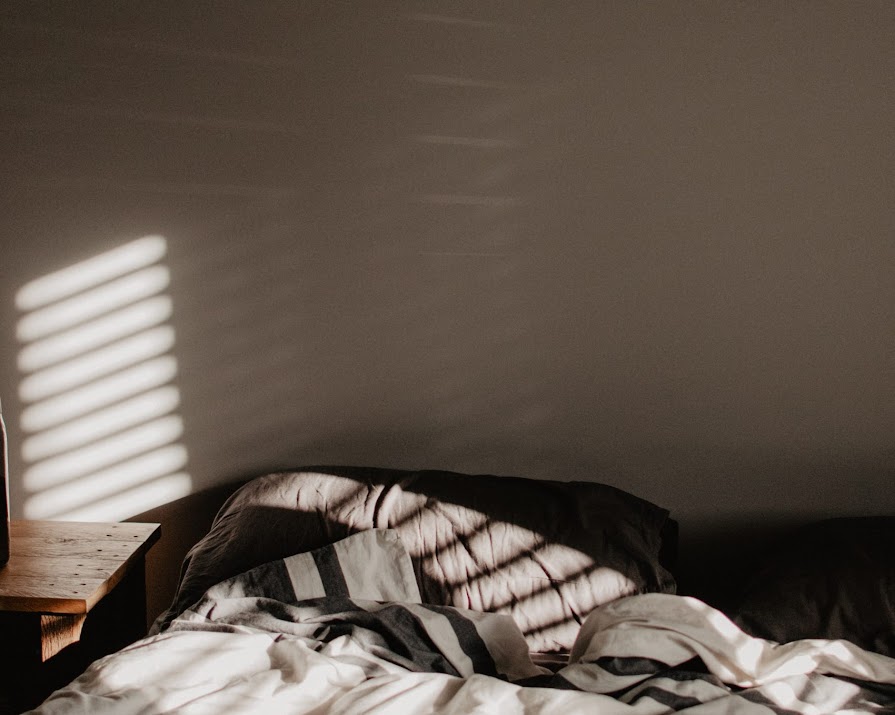By Jennifer McShane
29th Mar 2024
29th Mar 2024
Those who suffer from sleeping difficulties will be all too familiar with the nightmare scenario that comes with battling insomnia.
Lying awake, hour after hour, willing, pleading sleep to come and give your tired body and mind respite from the day before. But these frustrating demands are often ignored, and overtiredness kicks in as your worries swirl around your head.
Insomnia is a common problem that takes a toll on your energy, mood, health, and ability to function during the day. If the problem becomes chronic, the best thing to do first is to seek the advice of your GP, but as well as that, simple changes to your lifestyle and daily habits can help put a stop to sleepless nights. Recent studies have said that insomnia may be genetic but even so, often, simple tweaks to your all-day routine can prep you for a much better night’s sleep.
Make unwinding when you get home a priority
If walking in the door means confronting a pile of bills, hungry children, or the work you didn’t get to finish in the office, it’s understandable that relaxation can seem all but impossible. But it’s smart to start unwinding early in the evening, so you’re marking a transition from your stressful daily life to your evening. Pencil in a five-minute window of you-time where you brew a cup of calming chamomile tea, take a bath if you have time, or just sit quietly alone and pay attention to your body as it begins to unwind. This is essential as it will be impossible to sleep if you’re feeling in any way tense.
Smell your way to sleep
Lavender has a reputation as a mild tranquillizer. Simply dab a bit of the oil onto your temples and forehead before you hit the pillow. The aroma should help send you off to sleep. Or, put a drop of jasmine essential oil on each wrist just before you go to bed. Rose oil is also helpful; try sprinkling four or five drops on a tissue and hold it to your nose, taking 10 to 15 deep breaths before settling down to sleep.
Meditate
It isn’t for everyone, but regular meditation may be a powerful tool for some insomniacs. The science as to why is still equivocal, but we do know meditation sends signals to your sympathetic nervous system’s “fight or flight” response telling it that it’s all right to relax. It can also help you put aside thoughts from the day, so it’s especially useful for people prone to worry.
Use an app
In order to get a decent night of slumber, the advice is to stay well away from your phone, but the idea here is that the app plays in the background – with no light coming from your device. The blue wavelengths produced by your smartphone and other gadgets (and energy-efficient LED light bulbs) significantly suppress the production of melatonin, the hormone that makes you sleepy, according to research, but certain apps have been designed to help you drift into the land of Nod. Relax Melodies is one of the best; this free app enables you to listen to custom mixes of sounds from a selection of over 50 ambient melodies.
Try ‘Mantram’
This was suggested to me recently, and it’s basically a modern sheep-counting technique. Mantram is the practice of repeating over and over in the mind certain syllables, words, or phrases that help unify consciousness and counteract negative mental states. It is especially helpful for people with restless minds, whose turbulent thoughts keep them from relaxing, concentrating, and falling asleep. The repetition of a verbal formula is a way of focusing the thinking mind and counteracting the damage done to both mind and body by thoughts that produce anxiety, agitation, and unhappiness. Try experimenting with it – choose a word, sound, or phrase that is pleasing to you, and repeat it until you feel your senses begin to lull.
Don’t nap
When trying to establish a regular sleep-wake cycle, don’t nap. No matter how tempting it may be, an afternoon nap can make falling asleep at night even harder. “Extra” sleep on weekends can also throw off your regular sleep schedule and worsen midweek insomnia.
Photography by Unsplash.
This article was originally published in November 2021.























